#siege of tobruk
Text
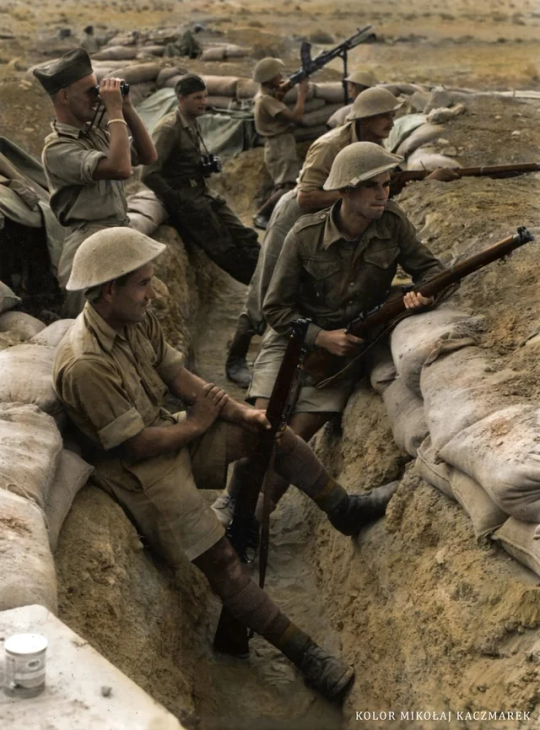
Polish Soldiers from the Independent Carpathian Rifle Brigade in the first defensive position, the so-called Red Line. Tobruk, 16 October 1941.
38 notes
·
View notes
Text
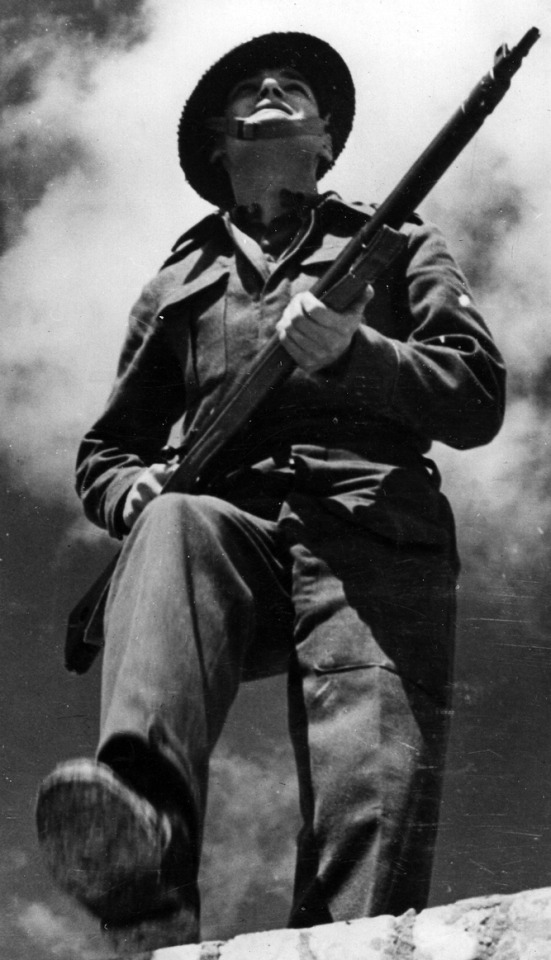
Soldat polonais de la Brigade indépendante de chasseurs des Carpates pendant le siège de Tobrouk – Campagne d'Afrique du Nord – Tobrouk – Libye – 1941
Les forces polonaises sous commandement britannique gagnèrent le surnom de 'Rats de Tobrouk' lors de leur premier engagement à Tobrouk.
#WWII#campagne d'afrique du nord#north african campaign#siège de tobrouk#siege of tobruk#armée polonaise#polish army#brigade indépendante de chasseurs des carpates#polish independent carpathian rifle brigade#rats de tobrouk#rats of tobruk#tobrouk#tobruk#lybie#libya#1941
12 notes
·
View notes
Text
Wounded (1/5)
Title: Wounded [AO3]
Characters: The Captain/Havers
Warnings: Spoilers for Series 5
Summary: 3 ways the Captain didn’t find out about Havers’s wound, 1 way he did, and 1 way he might have if life had been a little kinder to them both.
Chapters: 1 - 2 - 3 - 4 - 5
————
Wounded
Chapter 1: The Medal
The Captain had always known that Havers would do great deeds one day. He might not have been fortunate enough to see Havers’s brilliant mind in action on the battlefield but he’d known from the very first manoeuvre they’d done together at Button House that his lieutenant had all the necessary qualities to become an exemplary leader one day. Because Havers was not the kind of man to shout orders from the relative safety behind the lines. He was someone who led from the front; someone who didn’t mind getting his hands dirty and would never ask his men to do anything he wasn’t willing to do himself.
It was a quality the Captain had admired about him from practically day one – and desperately wished he didn’t have when he had to watch him leave for the North African front. Men like Havers rarely survived wars. The one they have found themselves entangled in might be over by Christmas – the Captain certainly thought so – but Christmas was still several months away. A lot could happen in those months, and every time a casualty list landed on his desk the Captain dreaded reading it, terrified of seeing Havers’s name in the column marked KIA – killed in action. The mere thought of Havers dying so far away from home, alone and probably scared, and without ever knowing–
The Captain shook his head. It was no use to dwell on things like that.
When Havers’s name inevitably stared up at him from an action report just a few days before Christmas in 1941, it was not in the context the Captain had expected and feared, thank god.
Lieutenant A. P. Havers: awarded the Military Cross for an act of exemplary gallantry against the enemy during the Siege of Tobruk.
The Captain’s eyes flew back to the top of the page, suddenly a lot more interested in the report than he’d been a moment ago. Havers’s actions during the siege had not only gained him the Military Cross but also a battlefield commission, making him a captain by rank just like him. Upon reading that, a smile began to tug at the Captain’s lips. He knew it wouldn’t take long for other people to notice Havers’s potential.
The smile faded when he reached the casualty report and Havers’s name glared up at him from the paper next to words like wounded, grenade blast and pieces of shrapnel to the face and neck. Havers had survived – the report made that clear – but the Captain’s chest still constricted as his mind conjured up horrible images of Havers’s face covered in blood and shaking hands reaching up to assess the damage.
He had seen wounds like that before – born by soldiers who were recuperating in the hospital on the neighbouring estate. Not a single one of them had escaped without suffering trauma to the eyes as well. The report didn’t clarify whether or not Havers had met the same fate but that did not mean he hadn’t.
Guilt churned in the Captain’s stomach. He should have been there. He should have been by Havers’s side and held his hand when the medic pulled the pieces of shrapnel from his skin; should have kept him company at the aid station and hospital and surprised him with his favourite chocolate to take his mind off the pain. Even better yet, he should have never let him go. He should have gone in his stead instead of staying home in England where it was safe and warm and war was nothing more than an abstract concept other people experienced in countries far away.
“I’m sorry,” the Captain whispered to the empty room. “I’m so sorry.”
His eyes strayed towards the window, past the gates that led away from the house, and for one desperate moment he wished he were looking out over a hot desert and saw Havers walk up to him, his gentle eyes smiling as if to say, “It’s all right.”
#the captain#lieutenant havers#capvers#caphavers#bbc ghosts#bbc ghosts spoilers#my fic#bbc ghosts fic
25 notes
·
View notes
Text
The Desert Rats (1953)

Basic Story: An Australian group of reinforcements led by an English Captain must hold Tobruk against Rommel's assault.
Fan Thoughts: The Desert Rats focuses on the Siege of Tobruk in 1941, through the eyes of an Australian division being led by English Captain ‘Tammy’ MacRoberts. Tasked with holding Tobruk for far longer than anticipated without relief, the situation chafes at the soldiers, who already do not like their Captain and his by-the-book attitude. The plot is very simple, with more of the focus being put on MacRoberts struggling with the weight of his decisions and their effect on the men under his command, although publicly he projects confidence. The acting is decent, although there are few opportunities for any of the actors to really shine. At the time of the film’s release, the critical response was mostly positive, however many former servicemen took issue with the historical and general military inaccuracies. While the film has no major detractors other than the historical errors, there is nothing to make it stand out either.
Warnings: none
Available On: Prime Video, Apple TV, YouTube, Google Play, Vudu
3 notes
·
View notes
Note
11 or 47 for one word writing prompts, if you have time on this glorious Monday.
i have my first aid exam for my driving license in two days, but i'm taking a break from watching videos of how to deal with arterial bleeding and broken spines <3
here's an SAS RH and a BOB starter:
11. — siege
The way Tobruk is under siege by Rommel could be best described thus: it's a bloody mess. Literally. There's so much blood, not even the desert can soak it all up. The ancient continent thirsts still. And the heat; even the heat is bloody, and the corpses that cannot be retrieved rot and bloat and liquefy within days because the soil thirsts for everything. Sometimes Jock Lewes dreams of being one of those many corpses out there under the sun, oozing black.
47. — glitter
The snow in Bastogne is different. It's sharp. It's a shrapnel. Back in the bayou Eugene would only hear of snow as some sort of magical powder that glittered like the most precious of gems.
Then he was marched to Bastogne, and the snow is a monster. Each crystal a leech. Merciless, just like the exploding pines and the German artillery.
Snow is awful.
And yet it glitters in the red flare. Soaks up that too.
#petit fours#sas rogue heroes#band of brothers#almost-a-class-act#i looooove eugene's episode in bastogne so much it's my favorite
5 notes
·
View notes
Text
Events 1.22 (before 1950)
613 – Eight-month-old Constantine is crowned as co-emperor (Caesar) by his father Heraclius at Constantinople.
871 – Battle of Basing: The West Saxons led by King Æthelred I are defeated by the Danelaw Vikings at Basing.
1506 – The first contingent of 150 Swiss Guards arrives at the Vatican.
1517 – The Ottoman Empire under Selim I defeats the Mamluk Sultanate and captures present-day Egypt at the Battle of Ridaniya.
1555 – The Ava Kingdom falls to the Taungoo Dynasty in what is now Myanmar.
1689 – The Convention Parliament convenes to determine whether James II and VII, the last Roman Catholic monarch of England, Ireland and Scotland, had vacated the thrones of England and Ireland when he fled to France in 1688.
1808 – The Portuguese royal family arrives in Brazil after fleeing the French army's invasion of Portugal two months earlier.
1824 – The Ashantis defeat British forces in the Gold Coast.
1849 – Second Anglo-Sikh War: The Siege of Multan ends after nine months when the last Sikh defenders of Multan, Punjab, surrender.
1863 – The January Uprising breaks out in Poland, Lithuania and Belarus. The aim of the national movement is to regain Polish–Lithuanian–Ruthenian Commonwealth from occupation by Russia.
1879 – The Battle of Isandlwana during the Anglo-Zulu War results in a British defeat.
1879 – The Battle of Rorke's Drift, also during the Anglo-Zulu War and just some 15 km (9.3 mi) away from Isandlwana, results in a British victory.
1890 – The United Mine Workers of America is founded in Columbus, Ohio.
1901 – Edward VII is proclaimed King of the United Kingdom after the death of his mother, Queen Victoria.
1905 – Bloody Sunday in Saint Petersburg, beginning of the 1905 revolution.
1906 – SS Valencia runs aground on rocks on Vancouver Island, British Columbia, killing more than 130.
1915 – Over 600 people are killed in Guadalajara, Mexico, when a train plunges off the tracks into a deep canyon.
1917 – American entry into World War I: President Woodrow Wilson of the still-neutral United States calls for "peace without victory" in Europe.
1919 – Act Zluky is signed, unifying the Ukrainian People's Republic and the West Ukrainian National Republic.
1924 – Ramsay MacDonald becomes the first Labour Prime Minister of the United Kingdom.
1927 – Teddy Wakelam gives the first live radio commentary of a football match, between Arsenal F.C. and Sheffield United at Highbury.
1941 – World War II: British and Commonwealth troops capture Tobruk from Italian forces during Operation Compass.
1943 – World War II: Australian and American forces defeat Japanese army and navy units in the bitterly fought Battle of Buna–Gona.
1944 – World War II: The Allies commence Operation Shingle, an assault on Anzio and Nettuno, Italy.
1946 – In Iran, Qazi Muhammad declares the independent people's Republic of Mahabad at Chahar Cheragh Square in the Kurdish city of Mahabad; he becomes the new president and Haji Baba Sheikh becomes the prime minister.
1946 – Creation of the Central Intelligence Group, forerunner of the Central Intelligence Agency.
1947 – KTLA, the first commercial television station west of the Mississippi River, begins operation in Hollywood.
0 notes
Text
World on Fire Season 2, Episode 4
Covering only four locations and with character journeys finally colliding, episode 4 makes for a much tighter plot as Kasia gets her first mission with MI5, Marga’s situation gets worse, the troops prepare for the Siege of Tobruk, and I get a new ship and David gets help from the French Resistance.

The French Storyline
I’ll start with the French storyline. After narrowly avoiding capture and dying in a plane crash last episode, David has managed to scrape by hiding in the forest in Brittany, but after days (weeks? months?) without much food or any medical care, he has barely enough energy to drag himself towards a garden on the edge of the woods. With an infection, a dislocated arm, a gnarly beard, and only the prominent RAF clothes on his back, he is saved in the nick of time by a French boy and his father who promise help from someone called “The Parisian.”
I think we all know who she is.

Now working under a new identity (technically, her second), Henriete lives in a town in Northern France and gives downed British airmen a hiding place before other members of the Resistance can give the men false identity papers and take them to the next leg of their escape route. The town is hardly safer than Paris, though. Anti-Semitic signs are plastered on the sides of buildings and posted on street corners.
Henriette tends to David’s dislocated shoulder as best she can. She has no morphine and has never done this procedure herself before, but David cannot scream in pain while she shifts the shoulder back into place. For his part, David bites down on a wooden spoon and complies.
David: Thank you. Very much.
Henriette [smirking]: The English. You are so polite.
David: I am most sincerely obliged to you, mademoiselle, for the excruciating pain.
Smooth, even if he was half-dead this morning.
I’ll admit, I spent so much of their scenes together whispering “Kiss! Kiss!” because, cliché as it is now and was then, they might die tomorrow. Two Jewish people finding each other while under persecution would be something beautiful amidst such evil. Dangerous, obviously, but they’re already in danger and alone.

(Don’t worry, honey, we’re gonna get you a straight man this season!)
Due to his injury and ailment, Henriette can’t move him right away, and has to risk keeping him overnight (or multiple nights). He tries to get to know her, but she keeps the details limited. When he asks how she knows English so well, she replies that a good friend taught her and gazes into the fireplace with a heavy silence.
Once more, the question of what happened to Webster remains unanswered, but I still believe there are multiple options for explaining his absence besides the obvious. So much attention has been made about having French papers this season, he could have simply been deported. Or imprisoned. Or helping the Resistance somewhere else. Perhaps this depends on whether Brian J. Smith is contracted to return. Given the story opportunities provided by an American character (particularly this American character), I hope so. It is 1941, after all.
But I digress.

The locals have lived in the town their whole lives and look at strangers like Henriette with curiosity, though the German occupation means that quite a few strangers are regularly moving through town. Still, her new identity as a Gentile woman whose husband is a prisoner of war with the Germans allows her freedom of movement while the Germans in Paris are looking for her.
But she isn’t free from danger. A local woman confronts Henriette after a trip to town and warns her that if the Germans suspect that someone is helping British airmen escape, the whole town could be executed. When I first watched this episode, the certainty with which the woman expected that reprisal threw me. Many of the massacres Germans committed against entire towns occurred in the second half of the war, especially in retaliation for Allied victories. One of the more infamous massacres in France was in Oradour-sur-Glane, carried out in June 1944 as revenge for D-Day.
However, I wouldn’t call this dialogue an inaccuracy or just potential foreshadowing. There were cities and towns with mass executions as retaliation for the Belgian, French, and/or British armies resisting the German invasion. Places like Vinkt (Belgium), Oignies and Courrières (France), etc. So now Henriette is facing the scenario Kasia did in season 1: do you continue to resist the occupation of your homeland and murder of your people, even if it means your actions could (and will) be used as an excuse for a bloody reprisal on civilians? Or do you stop and let the occupation and murders continue unimpeded?
Rattled by the encounter, Henriette is later visited by a German patrol who propositions her in exchange for food and “protection.” He frames it as a choice, one he’ll totally (not) respect, but as we’ve seen last season with Nancy and Schmidt and this season with Marga and her “partner” that there’s a line between consent and duress.
Hiding in a secret compartment under the stairs, David can only listen. Later, when Henriette helps him stagger from the hiding place, she tells him that they can travel to get morphine tomorrow. David protests, saying he’ll slow her down. She assures him that this is the only way. He doesn’t know France like she does, but in a few days, he’ll learn that she’s for him and he’s for her. The language calls to mind The Three Musketeers, but there’s a hint of a different interpretation in David’s eyes. Or maybe just mine.


(Kiss! Kiss!)
I’m not sure which resistance group Henriette is part of, but here is some information on the wider context of French occupation and resistance.
The German Storyline

Marga is pregnant, and as such, she is now regarded as a woman. Not by reaching a legal age or anything, just with the prospect of becoming the mother of a “pure” baby. As such, she is given praise like never before, but it’s not really for her, especially once she starts to have fainting spells.
When Marga collapses, there’s a match cut to a pile of sandbags in the desert, which is disturbingly fitting, given that all Marga is to this program is a protective container against the death of the “race.”
She’s having a rough pregnancy, which concerns the doctor. Could it be because she’s a teenager whose body is still adjusting to changes from puberty? Of course not! The doctor wonders if it’s a gene thing (not out of concern for her safety and the baby’s, but as a “racial purity” thing, which is why he inspects her facial profile).
She is ordered to start bed rest out of an abundance of caution, even though she isn’t even showing yet. Ironically, this cure could actually be making things worse for her health, physically and mentally. It seems like the only person she talks to is Astrid, who takes the bed rest literally and holds the keys to her prison cell of a bedroom.
The British Storyline

Kasia, meanwhile, has renewed purpose after feeling out of place and directionless for the past three episodes. Meeting her new boss at the MI5 office in Manchester, she is given her first assignment: follow a suspected Nazi spy, a Polish woman named Irena who works for a local Avro factory manufacturing warplanes. The latest design, the Lancaster, operated on four engines that could take a plane long distances even if one of the engines failed. It was a massive and durable plane, fitting a crew of seven men and thousands of pounds of bombs, desirable qualities for RAF night missions. (Is World on Fire setting up a Dambusters raid somewhere way down the line?)
As her cover, Kasia is given a dog and told to walk him each morning in a nearby park, where Irena does the same. While the cover works, Robina is less than pleased with the dog, adding yet another reason for tension between them. Jan, however, is over the moon at the prospect of having his own dog. He immediately names the dog Wilk (Wolf) and takes him to the park, where they run into Irena.
Kasia quickly discovers that this mission is going to be harder than she thought, as Irena seems just so…nice. They converse in Polish, they both lived in Warsaw, they hate the Nazis, Irena treats her like a daughter. For the first time in a long time, Kasia has someone to confide in about her experiences, someone who gets what it's like to have known Poland before the war and to have lost everything in the invasion.

But MI5 is not convinced. If Kasia is to succeed with them, she has to kill the last remaining part of her that trusts the good in people. This part of her nearly dies when she finds a dropsite in the park. Inside is a buried canister with a factory blueprint.
Distraught at the idea another Pole would work for the Nazis, Kasia passes on the discovery to James, who comforts her. Unfortunately, Robina notices James patting Kasia on the back and immediately assumes the worst.
James really turned on the charm with Robina this episode, inviting her for a picnic in the garden, complimenting her ability to take care of a house full of kids and her daughter-in-law (and her daughter-in-law’s dog), treating her to wine and scones and other hard-to-come-by treats.

(So that’s where the ingredients for Kasia’s poppyseed cake went!)
After all the smooth talking he’s given her for the past months, she’s finally starting to let her guard down with him–which is of course when she notices James comforting Kasia in the garden and doubles down on her mistrust of everyone but herself.
She accuses Kasia of cheating on Harry with James, much to Kasia’s bewilderment. “My son may have two hearts, but you Kasia are a woman, and I expect better than that!” Unable to think of a convincing lie, Kasia storms off, and an eavesdropping Jan asks Robina, “Do you love him?”
I’ll admit, I’m not a fan of this trope. I’d rather see the moment a character realizes they’re in love with another one than having a third person jump to that conclusion in case the audience hasn’t figured it out by now, but…it makes sense for Robina to refuse to acknowledge her attraction to James unless someone else confronts her about it. It also makes sense that she’d turn on Kasia instead of James, given her worldview of women having to shoulder everything with (what did James patronizingly call it?) a bland smile. Maybe in the next episode, Robina will make an apology cake for Kasia…or steal some scones from James’s secret stash.
But she may not have long to make it up to her. Kasia’s desire is still to fight, and perhaps her future lies not with MI5’s intelligence gathering, but with the spies in MI6. She may have a potential overlap with the French Storyline. After all, Warsaw was the Paris of the East…
Read More on Resistance, Intelligence, and Spies
Krystyna Skarbek - a Polish agent for MI6
George Bégué - French SOE agent
SOE Agents in France
The Libyan Storyline
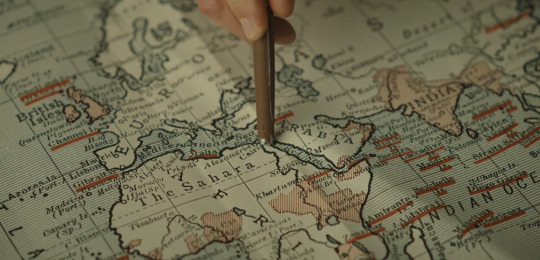
Harry is healed and back in action with Rajib, Stan, and the troops. Everyone looks exhausted and miserable as they’re given orders to stop a panzer division attacking Tobruk, even if it means holding the line to the last man.
What made Tobruk so valuable to the Allied and Axis forces? Tobruk was a coastal city with deep water ports and surrounding fortifications, which made it a perfect place to ship equipment, ammunition, and soldiers across the Mediterranean. It was connected via coastal road to nearby ports and cities, so incoming supplies could be distributed across the North African front.
Given its strategic importance, the city changed hands multiple times throughout the war. In January 1941, the Italian-held port was taken by the advancing British. In response, Germany made the recapture of Tobruk and other key Libyan cities one of its major missions. Leading the force would be Erwin Rommel, who was name-dropped last episode and is mentioned multiple times this episode. Within months, the British successes of Operation Compass (shown in episodes 1 and 2) were overturned.
As more Allied troops retreated back towards Egypt, it became necessary for some of the forces to remain in places like Tobruk and try to slow the Axis movement as much as possible in the meantime. These troops were led by Leslie Morshead and included:
A unit from the 3rd Indian Motor Brigade
Four British artillery regiments
The Australian 20th, 24th, and 26th Brigades of the 9th Division and the 18th Brigade of the 7th Division
The addition of Sollo, the Australian character, adds a new flavor to the desert scenes. While this season has done a good job of highlighting the accomplishments of the British Indian Army, seeing characters from a country with a very different relationship with the British Empire brings the characters into sharp relief. Plus, I love it when characters from stereotypically less rigid countries (like Randy from “Canada” in season 1) brush up against the more fastidious British characters.
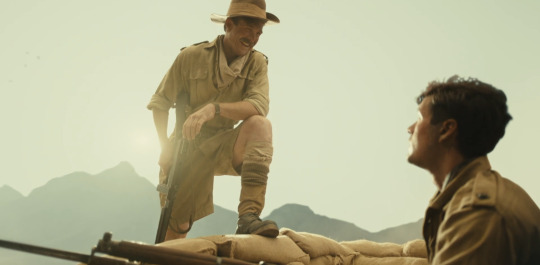
Jump scare Australians!
Sollo: You’re scared. Anyone who tells you they aren’t is an idiot.
When covering the siege of Tobruk, the Nazi propagandist William Joyce (better known as “Lord Haw-Haw” for his exaggerated upper class British accent–despite being American) referred to the Allied forces holding the fort as rats caught in a trap. His words had the opposite effect from intended, though, and some of the Australian forces adopted the nickname “The Rats of Tobruk” with pride and humor.
As in the real Siege of Tobruk, the Allied forces are left to dig in and endure attacks by tanks, infantry, and air. This is dramatized during the episode when Harry, Stan, Rajib, and new guy George are stuck in a fox hole as a German tank destroys an Australian cover where soldiers are trying to relay their coordinates to the rest of the men.
Harry, freshly returned from a hospital in Cairo, dashes through enemy fire to continue the transmission and helps one of the Australians get undercover. Stan is not happy with this rush of adrenaline and bravura though, snapping that Harry has a kid. (“Kid needs her dad. Not a hero.”)
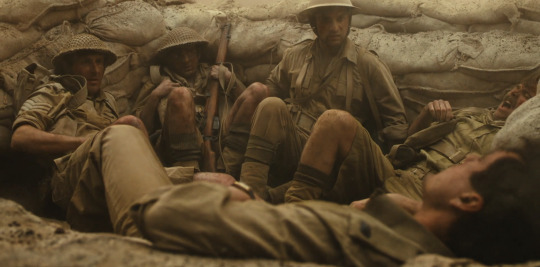
As in season 1, Harry’s romantic ideas about the world are constantly being challenged here. In this season alone, he’s:
Reunited his wife with her brothers after a daring rescue mission in Poland, but instead of this bringing the couple closer together, just opens up the can of worms that is his family.
Before he can even address his wife’s obvious PTSD, he is shipped out to another front, where once again his second in command, Stan, knows the ropes better than he does.
He is given medical treatment for a leg injury he got, not from combat in the desert, but a previous wound that reopened during a battle and became infected.
Against all odds, he is sent to the same hospital where Lois is, and just when they’re on the verge of reaching their previous understanding of one another, she pulls back and tells him to find his own reason to fight that isn’t about the women back home.
Now he does something heroic (or reckless), and Stan is yelling at him in front of everyone. Dude can’t win, even when he wins!
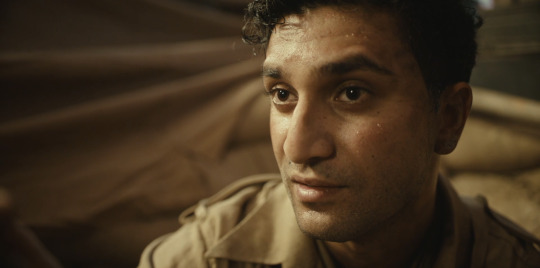
Speaking of which, things aren’t faring much better for Rajib, either. While he and Stan are on better footing after last episode’s escapades in the desert, this shift with some of the British soldiers has put him in an awkward position with the Indian soldiers. Meanwhile, a mustached British snob officer repeatedly refuses to salute Rajib, then berates him for his men’s obvious offense for the breach in manners.
On top of that, he can’t pour out his frustrations into letters home to his wife (that’s right, he’s married! Ten years! No name for his wife, though) are being opened and read by command.
Rajib: I have lost three of my men. This morning, my sappers moved mines with their bare hands. We have always believed that the English, with their famous decency, would reward our loyal service, but...our loyal service does not merit a salute. Does not even merit a decent packet of cigarettes. Can you make sense of it? I'm fighting for India by fighting for England. And I'm losing on all fronts.
Rajib and the Australian have a nice conversation about home and cigarettes. Throughout the Libyan subplot this episode, cigarettes are given a symbolic meaning, highlighting the difference between the way the British Indian Army is treated from its white counterparts.
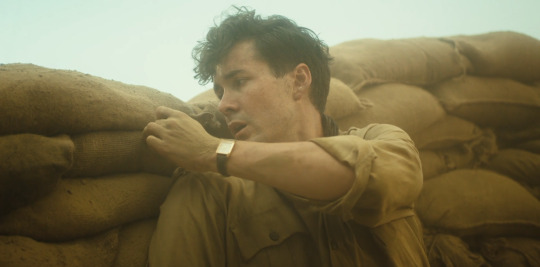
Later in the episode, Harry is shown walking alone along some caves, his thoughts elsewhere. When the familiar rumble of a plane starts to register, he initially doesn’t react. After all, in episode 2 Stan explained that the Italians flew over all the time without actually attacking anyone. Then it becomes clear that this is a German plane when the pilot begins to fire on Harry in a process known as strafing. Harry is able to narrowly avoid getting shot by ducking behind sandbags. As the plane continues past him, Harry reaches up and pulls out a bullet lodged in one of the sandbags just beyond his right ear. Suddenly confronted with just how close he came to dying in a random attack, Harry is filled with a new resolve.
Up until now, Harry has generally played second fiddle to the other characters this season. While he’s certainly been present and not dropped in for a single scene every now and then like Tom Bennet is, for instance, Harry in season 2 is not given anything near the attention and arc of season 1.
Hopefully this episode signals a change, though, just in time for the summer months in Tobruk, because despite the blitzkrieg levels of firepower directed at them and the original plans to stay behind for eight weeks, the combined Australian, British, and Indian forces held out against the Axis offensive for five months until replacements arrived. These replacements included the Polish Independent Carpathian Rifle Brigade, Czechoslovak 11th Infantry Battalion, and British 70th Infantry Division. So keep your eyes and ears alert for any mention of these groups in the next episode!
More on Tobruk
The National Archives
The Imperial War Museums
Australian War Memorial
The Army Museum of South Australia
History Extra
On the Rats of Tobruk
For a General Look at the History Covered in This Episode
PBS
1 note
·
View note
Text
Polar Vortex - Joe's Recap
Joe comes in with the third and final Polar Vortex recap!
This was my first time attending Polar Vortex, and the second opportunity to put my French Army to the test. Polar Vortex was my second Bolt Action event of 2023 after the successful Siege of Tobruk event at Golden Rhino Games in January. This was also my first escalation-style event in any game let alone Bolt Action and I couldn’t wait to see how it would go!
Game 1Prisoner Capture vs Dan…
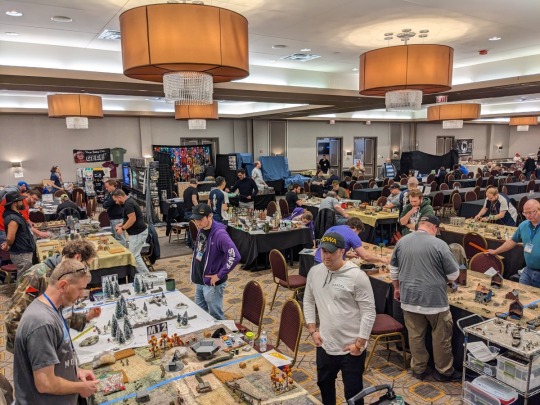
View On WordPress
0 notes
Text

Meine Damen und Herren! Welcome back to the cabaret! But perhaps life is not so beautiful just now.
Chapter 27: January 1942/April 1944
John is wounded during the siege of Tobruk.
#ao3#johnlock fics#sherlock bbc#sherlock fanfic#john watson#life is a cabaret#cabaret#kander and ebb#ww2
0 notes
Text
Sergeant George Booth, a twenty-nine-year-old observer with the RAF's No.107 Squadron, is usually credited as the first Briton to be taken prisoner in the Second World War. Booth's war ended the day after it had officially begun when his Bristol Blenheim was shot down over the German coast on 4 September 1939. The pilot was killed by the Wireless Operator, Air Gunner Larry Slattery, survived and, together with Booth, spent the next six years in captivity. They were among an estimated 170.000 to 200,000 British, Commonwealth and Empire men who were taken prisoner in Europe during the Second World War. This compares to the 90,000 Allied prisoners who were held in around a thousand camps around the Far East after Japan entered the war in late 1941.
Booth and Slattery left behind a country that was just embarking on what became known as the 'Phoney War' – when the population held its breath, waiting for a bombing onslaught that failed to appear. The first major influx of British POWs into German camps began nine months later in June 1940 when that phoniness gave way to a Blitzkrieg – or lightning war – as the Nazis swept down through the Low Countries into northern France. As the British Expeditionary Force (BEF), which had been sent to defend France, was evacuated from Dunkirk and other ports it was forced to abandon over 50,000 men who would spend the rest of the war as POWs. They entered captivity knowing that Britain faced the threat of invasion and that, if Hitler was successful, they were unlikely ever to see their homes again.
Each major Allied defeat made more men POWs. Germany's invasion of Greece and Yugoslavia in April 1941 was followed by the battle for Crete after which 11,370 Allied troops were captured in May 1941. The next big wave of POWs arrived from North Africa where Rommel was notching up significant victories. When he finally managed to break the siege of the Libyan port of Tobruk in June 1942, the garrison's 35,000 men, many of whom were South Africans, lost their freedom.
Since America did not enter the war until after Japan bombed Pearl Harbor in December 1941 only 62,000 of her soldiers became POWs in Europe. Most American POWs before D-Day were airmen. Soldiers began to be taken in large numbers when the Allies landed in Italy in 1943 and Normandy in 1944 and began to claw back parts of occupied Europe. The Germans captured over 6,000 men in September 1944 as a result of Operation Market-Garden when the Allies tried to establish a bridgehead across the Rhine at Arnhem; Hitler's surprise attack on the Ardennes (also known as the Battle of the Bulge) in a bitterly cold December 1944 led to around 23,000 Americans becoming POWs.
Most prisoners were soldiers. The nature of sea battles meant that few men serving in the Royal or Merchant Navy survived to becomes prisoners or internees – about 5,500 from each category. Around 13,000 British and Commonwealth airmen and 33,000 US airmen became POWs but their experience was very different from the other services. Of the 10,000 members of Bomber Command (about eight per cent of its total) who became POWs, many started their day with a British breakfast on British soil, and ended it in a cell where the enemy was keen to extract as much information from them as possible. The RAF did not suffer anything like the military setbacks of Dunkirk or North Africa and the peak year for Bomber Command was 1943-44 when 3,596 of their members became prisoners.
Becoming a prisoner in 1944 or 1945 felt quite different from becoming a POW in the early days of the war. Although the later prisoners had a sense that the war was drawing to a conclusion and that the Allies were winning, they still faced an uncertain future. Would they become hostages or even suffer execution at the hands of an enemy who felt he had nothing to lose?
— The Barbed-Wire University: The Real Lives of Allied Prisoners of War in the Second World War (Midge Gillies)
#book quotes#midge gillies#the barbed-wire university: the real lives of allied prisoners of war in the second world war#history#military history#naval history#aviation history#prisoners of war#ww2#phoney war#battle of france#dunkirk evacuation#britain#usa#germany#nazi germany#george booth#larry slattery#royal navy#merchant navy (uk)#raf
1 note
·
View note
Photo
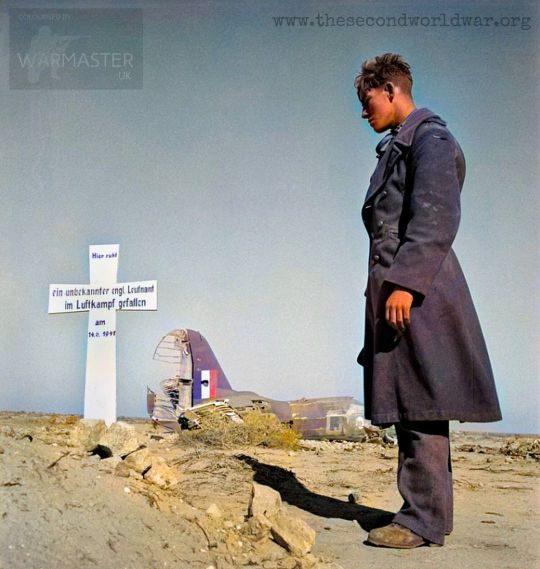
“Here lies an unknown English Lieutenant who died in the air war”, Western Desert, 1941 The Western Desert campaign took place in the deserts of Egypt and Libya and was the main theatre in the North African campaign of the Second World War. Military operations began in June 1940 with the Italian declaration of war and the Italian invasion of Egypt from Libya in September. The war was fought primarily in the area known as the Western Desert, which was about 390 km wide, from Mersa Matruh in Egypt to Gazala on the Libyan coast, along Litoranea Balbo, the only paved road. The Sand Sea, 240 km inland, marked the southern limit of the desert at its widest points at Giarabub and Siwa. In the spring of 1941, Rommel led Operation Sonnenblume, which pushed the Allies back to Egypt except for the siege of Tobruk at the port. At the end of 1941, Axis forces were defeated in Operation Crusader and retired again to El Agheila. In early 1942 Axis forces drove the Allies back again, then captured Tobruk after the Battle of Gazala but failed to destroy their opponents. The Axis invaded Egypt and the Allies retreated to El Alamein, where the Eighth Army fought two defensive battles, then defeated the Axis forces in the Second Battle of El Alamein in October 1942. The Eighth Army drove Axis forces out of Libya to Tunisia, which was invaded from the west by the Allied First Army in Operation Torch. In the Tunisian campaign the remaining Axis forces surrendered to the combined Allied forces in May 1943. Original photo by George Rodger #secondworldwar #ww2 #worldwartwo #worldwar2 #war #history #militaryhistory #military #colourised #colorized #colourisedhistory #colorizedhistory #color #colour #colorizedhistoricalphotos #colorization #colourisation #retro #classic #goldenoldies #colorizedphoto #colourisedphoto #grave #casualty #desertwar https://www.instagram.com/p/Clj7d0-KLVT/?igshid=NGJjMDIxMWI=
#secondworldwar#ww2#worldwartwo#worldwar2#war#history#militaryhistory#military#colourised#colorized#colourisedhistory#colorizedhistory#color#colour#colorizedhistoricalphotos#colorization#colourisation#retro#classic#goldenoldies#colorizedphoto#colourisedphoto#grave#casualty#desertwar
1 note
·
View note
Text
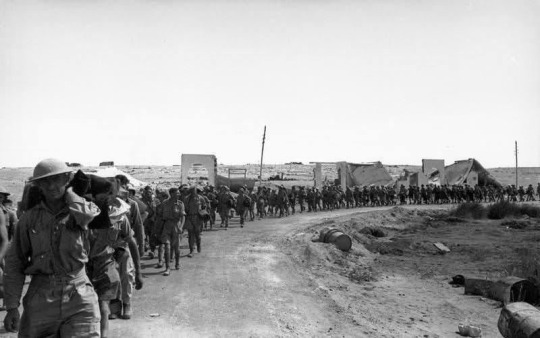
British and Commonwealth prisoners of war - marched out of Tobruk - after surrender of the Allied garrison of 33,000 soldiers to the German AfrikaKorps, c. June 20th 1942.
20 notes
·
View notes
Photo
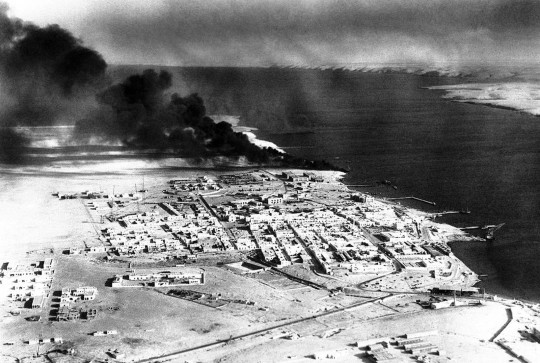
An aerial photograph of Tobruk (Libya, 1941), showing petrol dumps burning after Allied attacks.
#history#military history#aviation history#photography#ww2#north africa campaign#western desert campaign#operation compass#siege of tobruk#libya#italian libya#italy#britain
1 note
·
View note
Photo
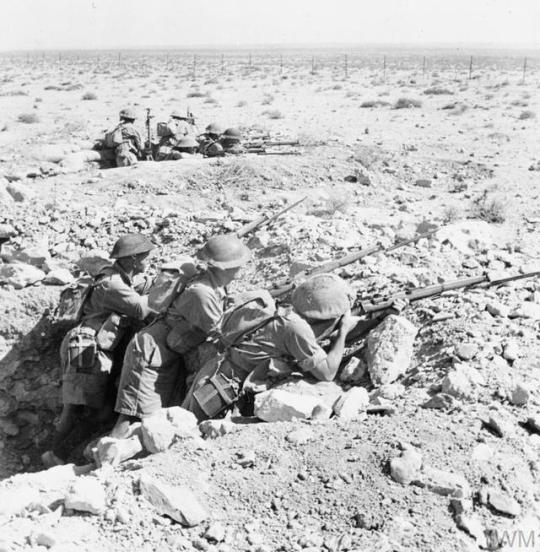
© IWM (E 4792) Australian troops occupy a front line position at Tobruk, 13 August 1941. Between April and December 1941 the Tobruk garrison, comprising Australian, Polish, Indian and British troops, was besieged by Rommel's forces. It fell to the Germans after the battle of Gazala on 21 June 1942 but was recaptured five months later.
38 notes
·
View notes
Text
Events 1.22
613 – Eight-month-old Constantine is crowned as co-emperor (Caesar) by his father Heraclius at Constantinople.
871 – Battle of Basing: The West Saxons led by King Æthelred I are defeated by the Danelaw Vikings at Basing.
1506 – The first contingent of 150 Swiss Guards arrives at the Vatican.
1517 – The Ottoman Empire under Selim I defeats the Mamluk Sultanate and captures present-day Egypt at the Battle of Ridaniya.
1555 – The Ava Kingdom falls to the Taungoo Dynasty in what is now Myanmar.
1689 – The Convention Parliament convenes to determine whether James II and VII, the last Roman Catholic monarch of England, Ireland and Scotland, had vacated the thrones of England and Ireland when he fled to France in 1688.
1808 – The Portuguese royal family arrives in Brazil after fleeing the French army's invasion of Portugal two months earlier.
1824 – The Ashantis defeat British forces in the Gold Coast.
1849 – Second Anglo-Sikh War: The Siege of Multan ends after nine months when the last Sikh defenders of Multan, Punjab, surrender.
1863 – The January Uprising breaks out in Poland, Lithuania and Belarus. The aim of the national movement is to regain Polish–Lithuanian–Ruthenian Commonwealth from occupation by Russia.
1879 – The Battle of Isandlwana during the Anglo-Zulu War results in a British defeat.
1879 – The Battle of Rorke's Drift, also during the Anglo-Zulu War and just some 15 km away from Isandlwana, results in a British victory.
1890 – The United Mine Workers of America is founded in Columbus, Ohio.
1901 – Edward VII is proclaimed King of the United Kingdom after the death of his mother, Queen Victoria.
1905 – Bloody Sunday in Saint Petersburg, beginning of the 1905 revolution.
1906 – SS Valencia runs aground on rocks on Vancouver Island, British Columbia, killing more than 130.
1915 – Over 600 people are killed in Guadalajara, Mexico, when a train plunges off the tracks into a deep canyon.
1917 – American entry into World War I: President Woodrow Wilson of the still-neutral United States calls for "peace without victory" in Europe.
1919 – Act Zluky is signed, unifying the Ukrainian People's Republic and the West Ukrainian National Republic.
1924 – Ramsay MacDonald becomes the first Labour Prime Minister of the United Kingdom.
1927 – Teddy Wakelam gives the first live radio commentary of a football match, between Arsenal F.C. and Sheffield United at Highbury.
1941 – World War II: British and Commonwealth troops capture Tobruk from Italian forces during Operation Compass.
1943 – World War II: Australian and American forces defeat Japanese army and navy units in the bitterly fought Battle of Buna–Gona.
1944 – World War II: The Allies commence Operation Shingle, an assault on Anzio and Nettuno, Italy.
1946 – In Iran, Qazi Muhammad declares the independent people's Republic of Mahabad at Chahar Cheragh Square in the Kurdish city of Mahabad; he becomes the new president and Haji Baba Sheikh becomes the prime minister.
1946 – Creation of the Central Intelligence Group, forerunner of the Central Intelligence Agency.
1947 – KTLA, the first commercial television station west of the Mississippi River, begins operation in Hollywood.
1957 – Israel withdraws from the Sinai Peninsula.
1957 – The New York City "Mad Bomber", George P. Metesky, is arrested in Waterbury, Connecticut and charged with planting more than 30 bombs.
1963 – The Élysée Treaty of cooperation between France and West Germany is signed by Charles de Gaulle and Konrad Adenauer.
1967 – Between dozens and hundreds of anti-Somocista demonstrators are killed by the Nicaraguan National Guard in Managua.
1968 – Apollo 5 lifts off carrying the first Lunar module into space.
1968 – Operation Igloo White, a US electronic surveillance system to stop communist infiltration into South Vietnam begins installation.
1970 – The Boeing 747, the world's first "jumbo jet", enters commercial service for launch customer Pan American Airways with its maiden voyage from New York's John F. Kennedy International Airport to London Heathrow Airport.
1971 – The Singapore Declaration, one of the two most important documents to the uncodified constitution of the Commonwealth of Nations, is issued.
1973 – The Supreme Court of the United States delivers its decisions in Roe v. Wade and Doe v. Bolton, legalizing elective abortion in all fifty states.
1973 – The crew of Apollo 17 addresses a joint session of Congress after the completion of the final Apollo moon landing mission.
1973 – A chartered Boeing 707 explodes in flames upon landing at Kano Airport, Nigeria, killing 176.
1973 – In a bout for the world heavyweight boxing championship in Kingston, Jamaica, challenger George Foreman knocks down champion Joe Frazier six times in the first two rounds before the fight is stopped by referee Arthur Mercante.
1984 – The Apple Macintosh, the first consumer computer to popularize the computer mouse and the graphical user interface, is introduced during a Super Bowl XVIII television commercial.
1987 – Philippine security forces open fire on a crowd of 10,000–15,000 demonstrators at Malacañang Palace, Manila, killing 13.
1992 – Rebel forces occupy Zaire's national radio station in Kinshasa and broadcast a demand for the government's resignation.
1992 – Space Shuttle program: The space shuttle Discovery launches on STS-42 carrying Dr. Roberta Bondar, who becomes the first Canadian woman and the first neurologist in space.
1995 – Israeli–Palestinian conflict: Beit Lid suicide bombing: In central Israel, near Netanya, two Gazans blow themselves up at a military transit point, killing 19 Israeli soldiers.
1998 – Space Shuttle program: space shuttle Endeavour launches on STS-89 to dock with the Russian space station Mir.
1999 – Australian missionary Graham Staines and his two sons are burned alive by radical Hindus while sleeping in their car in Eastern India.
2002 – Kmart becomes the largest retailer in United States history to file for Chapter 11 bankruptcy protection.
2006 – Evo Morales is inaugurated as President of Bolivia, becoming the country's first indigenous president.
2007 – At least 88 people are killed when two car bombs explode in the Bab Al-Sharqi market in central Baghdad, Iraq.
2009 – President Barack Obama signs an executive order to close the Guantanamo Bay detention camp; congressional opposition will prevent it being implemented.
0 notes
Photo
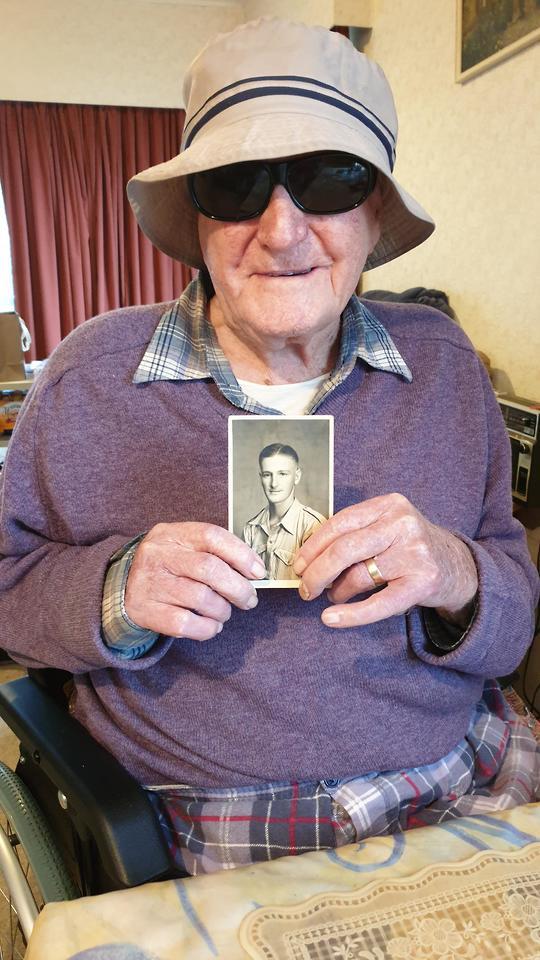
This is my Grandfather Jack, he fought at the Siege of Tobruk, the Battle of El Alamein and then helped liberate France. This is him holding a photo of his younger self and was taken the Day after his 100th Birthday Party. - See more viral images on ViralTiger.org
0 notes